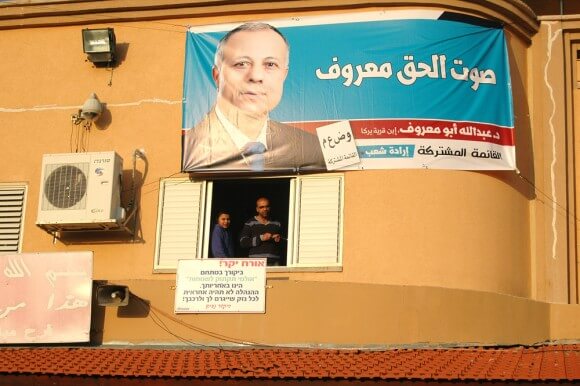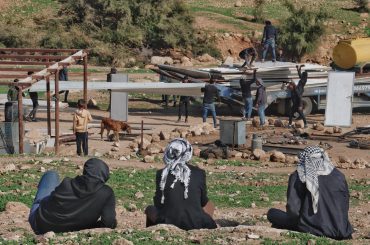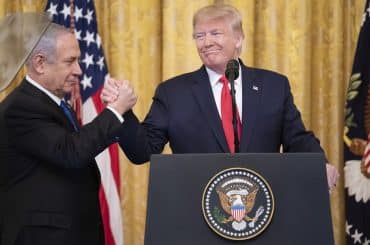Just a few months ago, people wondered if there would even be one Palestinian in the next Knesset. A change in voter threshold laws meant most of the parties would not be able to survive. Then the three groups unified under a single banner headed by Ayman Odeh, 41, a first time Knesset candidate from Haifa who started his career in public office at the age of 23 on Haifa’s city council. Now the long road is coming to and end and the Joint Arab List appears to be the third largest party in the country with the potential, for the first time, to influence the outcome of elections.
In the race to the polls Odeh has been interviewed by Israeli media more than any other Arab politician. He is congenial, soft-spoken and comments often and emphatically about Arab-Jewish partnership. Other Palestinian citizen of Israel politicians are embattled characters who gained notoriety for being the recipients of physical attacks by their peers in government, or ending their careers in exile. By contrast Odeh has escaped harassment from opposing political groups who focused their negative ads this year on more controversial Arab-Palestinian figures in Knesset, leaving Odeh to rise to a celebrity status. He is perhaps the first candidate from an Arab party who is both a household name in Israel and positively regarded. His base views that alone as an achievement.
I joined his campaign on Friday where he was in the last stretch of a six-week hustle. That day, as on most others, he spoke at six events and squeezed in scores of brief interviews outside of the event venues where supporters lined up to greet him. I asked him about what he intends to do once in Knesset and if his group would back the centrist Zionist Camp, if they were asked to do so, in order to prevent Netanyahu from taking a fourth term as prime minister.
In the afternoon Odeh made two stops in the northern city of Acre for a tour of the Old City and a backyard talk. Small cups of coffee were passed around, served by one of the Arab List candidate’s nephews, as Odeh promised voters Knesset was only part of a broader “disciplined struggle.” He hoped to ride off of the election momentum and in one year’s time organize a week-long Arab-Jewish march across Israel in the name of equality among all citizens and an end to the occupation of the Palestinian territory.
“From Nazareth to Jerusalem, like Martin Luther King on 28th August, 1963, I have a dream. We want the participation of tens of thousands of Arabs and the Jews, because they’re clever,” he said. The crowd cheered him and his optimism on.
There is a running joke on Odeh’s campaign that he is late wherever he goes. He is stopped on the sidewalk where voters rush to shake his hand and take photographs. Odeh was around an hour late for his third stop, a convention hall in Yirka, a Druze village in the Galilee. Around the corner from the rally signs for Naftali Bennett’s Jewish Home party were plastered next to the Joint Arab List’s. The Jewish Home usually wins a few thousand votes from Palestinian citizen of Israel because the group pushes for social benefits, despite rhetoric in this election that called for expulsion of Israeli Palestinians to the West Bank.


Merging four factions into the Joint Arab List with Odeh as the face of the campaign proved to be a game changer—not just for the Arab parties. Polls suggest that 65 to 70-percent of all Palestinian citizens of Israel will come out on Election Day, which effectively means two decades of election boycotts are over. Arab parties now have a huge base to pull from because 20 percent of Israel’s population is Palestinian. This would translate into 13 to 15 seats in the Knesset out of a total of 120. Israel’s system is parliamentary; in a coalition government, a simple majority from the Knesset selects the next prime minister, who controls the government.
But Odeh is keeping his cards close to him on how his group will use their leverage. The race between the center-left bloc, the Zionist Camp headed by Issac Herzog and the right-wing union led by Benjamin Netanyahu, is so close that Odeh’s party may be called upon to back Herzog in order to unseat Netanyahu. If that happens, Odeh told his constituents in Acre, he would keep hardliners like Avigdor Liberman out of the ruling coalition. It would be a flexing of power by Arab parties Israel has never seen.
Another election result could land Odeh as the leader of the opposition, a first time for any Arab politician in Israel. Odeh and his campaign staff, mostly young men in their 20s who got their feet in the door by working on failed municipal campaigns for Israel’s Arab-Jewish communist party, are prepared for this. They think that Herzog and Netanyahu may join forces after the ballots close on March 17th and form a national unity government, alternating as prime minister in a two-year rotation, and icing out the Arab list. In Israel’s history, Arab political parties have never been asked to join a ruling coalition. But for Odeh, this would still be a victory. If Herzog and Netanayhu unite, if his party is the next largest vote-getter, he would become the leader of the opposition and get special speaking privileges inside of Knesset.

Questions are edited. Answers were given in Arabic and translated to English.
If the Zionist Camp headed by Isaac Herzog wins the election and then asks the Joint Arab List to help him form a coalition where he will become prime minister, will you agree to support him?
Odeh: Conditions are not ripe for becoming part of the coalition. Any future government may bomb Gaza, may demolish homes in the Naqab [Negev]. Half of the budget will be allocated for security considerations, will be allocated to the settlements rather than allocated to impoverished sectors.
In 1993 Yitzhak Rabin was able to form a government by seeking support from the Arab parties. However, breaking with protocol, he then did not ask them to join the government. Do you fear this could happen again, where the Arab parties will support a prime minister who will then refuse to allow you into the ruling coalition?
O: We supported the government of Rabin from the position of producing peace and equality – so we are ready to study the current situation.
There is growing talk about a third outcome to the elections, where Herzog and Netanyahu will share the position of prime minister and form a national unity government, a coalition of the left and right. If that occurs, what will happen to the Joint Arab List?
O: In a case where Herzog is going to establish a national unity government, we will be the leadership of the opposition. This will be the first time in our history that an Arab will preside over the opposition and this is a very important platform. After the prime minister speaks, the opposition leader speaks. When a foreign president or prime minister is received, he meets with the opposition leader. This is a very important platform from where we may be able to raise our case.
How willing is the Joint Arab List to working with Israeli political groups after the elections when you are inside of the Knesset? Are you willing to compromise your platform?
O: I believe in dialogue with other parties. If there was a party prepared to meet with us halfway– for example, I will be glad to meet them halfway and maintain our differences in the rest of the cases. I also say to the Jewish-Israeli public and all the marginalized people, the poor: vote for what you see.
We will be with you. I say to those disabled: vote for what you want, we will vote with you. I say to the pensioners: vote for who you want, we will be with you.
What do you see is the role of the Joint Arab List after the elections?
O: We aim to shape the democratic and moral alternative in this country. There is the nationalist right-wing camp. There is the Zionist camp. We will be the democratic camp in the country. We have a specific focus: We aim to strengthen our partnership with the democratic Jewish camp, to the extent that there is a true democratic camp. The coming year or two will be the years for strengthening the relationship between the Arab and Jewish democratic camps.
The estimated voter turnout rate for Arab-Palestinian citizens of Israel is just under 70-percent, which means without any official announcement, the two-decade long Arab boycott of Israeli elections has effectively ended. How did the Joint Arab List achieve this?
O: Hope is what most inspires people to vote. When the people have hope, the people will head to the polls to vote. In the 90s [before the election boycott], the voting rate reached 78-percent because people had hope for success in Oslo and the Peace Process. But people lost faith in the last decade. However, in my opinion, the present hope for the public is to prevent the right from organizing a government resembling the previous one.
This personal faith and sense of change is what increases voter participation in addition to the union [Joint Arab List], which was requested by the public. The people requested this union. The people requested this broad list.
We adopted the wishes of the people. The people also recognize that in addition to the general politics there are internal considerations. In our union, we will fight social ill. In our union, we will build organizations for our people [Palestinian citizens of Israel].
What do you think is the significance of, for the first time, all Arab parties in Israeli uniting under one header?
O: Practically and in the opinion of our Arab people, this is a historical and unprecedented moment since 1948. All of this was done so that we could increase the voter participation of the Arab public.



Insh’Allah my daughter and myself with march with Arabs and Jews, from Nazareth to Jerusalem – that will be a miracle – amen!
“we will be the leadership of the opposition”
I fervently hope so! Thank you for this wonderful article, Allison.
It stirred that place within me that harbors hope. Good luck to Ayman Odeh and the Joint Arab List.
As Gideon Levy wrote:
“Are there many other party heads as impressive, eloquent and refreshing as Ayman Odeh? Are there many other MKs as outstanding as Ahmad Tibi, Jamal Zahalka, Dov Khenin and even, yes, even Haneen Zoabi? Is there another party that does not demand “support for Israel Defense Forces soldiers” at the start of every pointless war?
If the overwhelming majority of Arabs vote for them, they will, for the first time, enter the heart of the political dialogue in Israel – to the annoyance of nearly all the other parties.
If many Jews also vote for it, we can begin to speak of a “game changer,” and perhaps even of a good omen.
Just imagine: The Joint List is the third largest party in the Knesset. The coalition belongs to Netanyahu, Herzog and Yair Lapid. Odeh is selected leader of the opposition…..
The prime minister is obligated to brief him on security and diplomatic matters, “no less than once a month,” by law. The law requires him to address the Knesset after every speech by the premier. Foreign heads of state meet with him and listen to his views. As a symbol of government, he is protected by the Shin Bet security service. Perhaps for the first time in its history, Israel has a true leader of opposition.
A few stereotypes will be shattered in a single, not-imaginary act that might also usher in a deep change in consciousness.”
http://www.haaretz.com/opinion/.premium-1.645750
Help me understand the math here:
Twenty percent of 120 seats is 24. What accounts for the difference?
So maybe you want to walk back the alarmism you displayed a year ago when Israel raised the threshold to a still-low 3.25%, and you all complained that it was a plot to disenfranchise the Arab vote, because the Arabs were split amongst four very small parties that were all around the threshold. I said back then:
“I think that’s a little misleading. Israel has one of the lowest thresholds in the world, even with the change. There is no question, at all, that having such a low threshold has led to a lot of political instability. There are a lot of analysts who think that the higher threshold will strengthen Arab political involvement by forcing either the creation of a large enough coalition to meet the threshold (as opposed to three or four Arab parties) or by spurring the Arabs to join one of the larger parties, much as the settlers joined Likud and now enjoy more power there than they did when they were spread out over smaller parties.”
Seems to me the analysts were right. The Arab parties joined together, and now have a joint list that has far, far more power than the four small tiny parties did a year ago.
Not every Palestinian-Israeli will vote for the joint list; they’re not a monolith. But enough will to give Arabs in Israel leverage that they have not had before. At worst, Odeh will lead the opposition, and at best, they’ll be part of the government. Either way, it will be a positive thing for Israel in the long-term.
I wish him well…!!